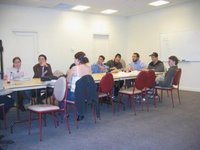The Rebbe Writes
The following letter was written to Mrs. Devorah Groner, wife of Rabbi Yitzchok Groner (of blessed memory), emissary of the Lubavitcher Rebbe in Melbourne, Australia, who headed the institutions there, and was a pioneer and builder of the Melbourne Jewish community.
11th of Cheshvan, 5721 [1960]
Blessing and Greeting:
I received your letter of Monday, Parshas Noah, and the two preceding letters. Although I have discussed the matter at length with your husband, who will undoubtedly convey to you my thoughts, I wish to put down in writing at least several points, in the hope that this letter will contribute to a happier outlook on the various matters about which you wrote in your letter.
First of all, in regard to your question, "Whose ship is it?" I am surprised that you should have any doubts about it, since, obviously, the ship is that of my father-in-law of saintly memory, our Nossi [leader] and the Nossi of our people. It is explained in the Zohar and in the Tanya at length that Tzadikim [the righteous] continue to partici-pate in our world even in afterlife, and, moreover, in a greater degree that during their life on this earth, since in their exalted state they are free from physical limitations. Happy are they whom he has enrolled in his crew and has assigned to them various tasks. The more responsible a task is, the greater is the reward, of course, both in this world and in the world-to-come.
You mention other points in your letters, concerning opinions and attitudes of other people, the lack of appreciation, etc., all of which you seem to have taken in a rather sensitive way, which gave rise to your thoughts on the relative disadvantages of your husband's present position by comparison with his previous one. As I have emphasized to your husband, the difference between his present work and his previous work is not a difference of place or surroundings, but a difference of the essential quality and character of the work itself. For previously he was in the capacity of an employed "clerk", and as such, there were certainly a number of advantages. A clerk has definite hours, and upon completion of his day's work he can dismiss it from his mind, knowing that the responsibility lies squarely on the shoulders of his superior. He need only to do the task given to him, in his best way, and he can then feel no worries, responsibilities or other commitments. Furthermore, such a job arouses a minimum of envy, less nervous strain, etc.
On the other hand, when one has the task of an executive, upon whom the full responsibility rests, all the more so being at a great distance, and having to make decisions, and especially when he takes up such a job willingly and enthusiastically and is successful, it is bound to call forth envy. And envy is such a mental state that it evokes various feelings in the envious person and other expressions, which frequently are inconsiderate and unjustified and very often - the envious person himself regrets them. It is also obvious that such a position entails greater personal commitment, nervous strain, etc.
Obviously, one whose capacity limits him to a secondary position, such as that of a clerk, there is little he can do about it, as this is all that he can accomplish. On the other hand, one who has the capacity to be an executive and in charge of a responsible undertaking, if such a person should confine himself within the framework of a clerk's job, it would be a gross injustice even to himself, not to mention to the cause. It is written, "More knowledge, more pain," and the more knowledgeable and advanced person is inevitably involved in more complicated things. One can say: "I don't want to be on the higher level, so that I be spared the pain." But this would be like a person saying: "I don't want to be a human being; I want to be like an animal and be spared all the pain associated with human life."
Aside from the above general considerations and principles, if one considers the specific work of disseminating and strengthening Yiddishkeit [Judaism], the outlook assumes new dimensions. For our Sages say that the first word of the Torah, Bereishis ["In the beginning"], indicates that the whole of creation is for the sake of Torah, which is called Reishis [the first]. Considering further that the work concerns education of Jewish boys and girls, which is not only of vital interest to themselves but also to posterity, for all generations to come, we arrive at a further dimension, namely, the second interpretation of Bereishis: "For the sake of the Jewish People who are called Reishis."
Furthermore, there is the added dimension in that the work is carried on in a country where Judaism is still in its infancy, requiring a real pioneering spirit to transform the whole of Jewish life in that remote continent. What a challenge and opportunity such work offers to the qualified person!
continued in next issue
Thank you for your comments, feedback and suggestions
- Please click here to send us your comments, feedback or suggestions
- There are currently "3719" members.
- Please note that the underlined bullets on the left side of this page are links, which are updated weekly.
- Contact Us
A current Insight:
When you give for a worthy cause, it is really only a loan and G-d Himself is the guarantor. Furthermore, the more you give, the more you get. I don't mean this figuratively. I say so you will test it and see for yourself



No comments:
Post a Comment